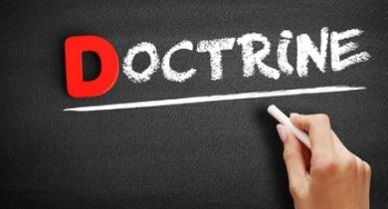Doctrine Of Exhaustion Of Ipr Through Indian Lens
Introduction
Doctrine of Exhaustion is one of the well-known aspects in the Intellectual Property domain. In simpler terms what this doctrine basically entails is, that the proprietor of an intellectual property cannot influence or restrict subsequent sales of products exhibiting that intellectual property after a legitimate transaction of sale has happened. The fundamental element is that the buyer of the products or services is free to use or discard it without subsequent restrictions as soon as the registered proprietor has been able to derive adequate profit from the first sale or positioning in the market.[i]
[Image Sources : Shutterstock]
For the very first time the doctrine found a mention in the decision of Bloomer v. McQuewan[ii], wherein the United States Supreme Court drew a distinction between procuring a patented machine and securing a license to use the patent’s rights. An inventor who can establish that his or her creation meets parameters for innovation, non-obviousness, and utility will be awarded a patent, which is a compendium of exclusive rights. The authority to manufacture, use, sell, and import the patented products into that nation are all included in these exclusive protections.
The patentees’ exclusive privileges are subject to some restraints under the doctrine of exhaustion. This principle says that “the initial approved sale of a patented item eliminates all patent rights to that product.”[iii] In other words, she has no authority over how the specific product, which had already been sold once, is resold, or circulated. If this “exhaustion” of rights had not occurred, the buyer of a patented item may have been prohibited from selling or even “using” the item because doing so would have infringed the patentee’s exclusive privileges.[iv]
Doctrine Of Exhaustion & Types
Now that we are aware of the fact that, the subject of IPR exhaustion is one that is left for the national government to decide. As a result, the exhaustion of IPR doctrine is categorized into the following categories.
International Exhaustion
Conforming to this, a product is freely circulated between nations as a single market once it is available for sale anywhere in the world by the IP owner herself or an authorised person. Conforming to the legal rules of the “Indian Patents Act of 1970”, India embraces the concept of international exhaustion[v], and the Indian judiciary did uphold this particular exhaustion in the case of “Kapil Wadhwa and Ors. vs. Samsung Electronics Co. Ltd.”[vi]
National Exhaustion
This forbids the IP owner from domestically pursuing the associated IPRs against persons possessing, using, or reselling a particular commodity because an authorised sale of a good embodying the protected IP exhausts the right to use and resell the product in dispute within the domestic market. The USA is one of the countries that conforms to the concept of national exhaustion.
Regional Exhaustion
This suggests that once the commodities secured by IP are put into circulation in any area of that region, the IP owner’s privileges are exhausted and the IPR-protected commodity is permitted to circulate throughout that territory.[vii] The UK abides by the principle of regional exhaustion, whereby goods manufactured within the European Economic Area (EEA) may be resold throughout the Member States without IPR constraints, and rights holders may implement import restrictions from other countries, outside EEA.
Parallel Import and Exhaustion of IPR
Parallel imports, popularly referred to as “grey market imports,” are legitimate, authentic goods that are brought into a nation and traded there without the permission of the owner of the intellectual property (IP). These are different from pirated products.
In the landmark judgement of “Kapil Wadhwa and Ors. Vs. Samsung Electronics Co. Ltd.,”[viii] the Hon’ble two judge Bench of the High Court of Delhi reached a conclusion on whether parallel importation of commodities and their resale without the authorization of the owner of the trademark constitute intellectual property abuse. In this instance, Samsung, the respondent, contended that the appellants were buying printers manufactured and distributed by Samsung from an international market under the trademark “Samsung” and, after sourcing the products into India, were selling them there under Respondent’s trademark, amounting to violation of Respondent’s registered trademark rights in India.
The Court decided that the Appellants must distinctively exhibit in their stores that the product sold by them has been sourced from abroad and that the Respondents do not give any warranty qua the supplies or provide any after sales assistance. The Division Bench consequently deduced that the parallel importation of goods without the certified proprietor’s express authorization does not represent an infringement of trademark rights since Indian law acknowledged the principle of international exhaustion, which provides that once the sale takes place by the IP holder or with his express permission in any area of the world, the IP rights are depleted. The essential condition in this case, however, is that after the commodities are released onto the market, their conditions cannot be amended or degraded.
Uncertainties with the interpretation of the Doctrine of exhaustion in India still exist with the courts taking divergent views and as a result derailing from the long-held notion that in India it is the International Exhaustion of Intellectual property rights that prevail over the other two types states above. Now this can be substantiated further by ruling of the High court of Delhi in the case of “John Wiley & Sons Inc. & Ors. vs Prabhat Chander Kumar Jain & Ors.”[ix] In this case, New York-based John Wiley & Sons Inc. asserted possession of the copyrights to the contentious works and marketed them at a concession in India and other Asian nations. Therefore, books that would have been overpriced were made affordable in India and other
Asian nations with the disclaimer that they could only be sold in “Bangladesh, Myanmar, India, Indonesia, Nepal, Pakistan, Sri Lanka, and Vietnam.” As a result, the book cannot be exported again and must be conveniently available to be purchased in the country that Wiley India Pvt. Ltd. formally consigns it to.
The plaintiffs accused the defendants of marketing their books for cheap in jurisdictions including the USA, UK, and others where they were not authorized to be sold. Therefore, under Section 51 of the Copyright Act, 1957,[x] the same equated to a breach of their copyright. While sympathizing with the plaintiffs and denying acceptance of the international exhaustion of copyright in India, the Hon. Delhi High Court observed that since there was no specific provision for international exhaustion under Indian legislations, it would be adequate to limit the practicability of the same to regional exhaustion.
The laws pertaining to the concept of first sale of copyright in India continues to still be illusive and transparent considering the contradictory opinions held by Courts on the subject and the practical application under Section 14(ii) of the Copyright Act, 1957.[xi]
Conclusion & Suggestions
There still exist a grey area when it comes to the implementation of Doctrine of Exhaustion of IPR in Indian jurisdiction, the reason behind this is clearly the different approaches taken by the judiciary in interpreting the statutes. This has clearly resulted in a dilemma that needs to be addressed.
Parallel importation and international exhaustion of rights have deleterious economic ramifications because they facilitate individuals to buy genuine products at low prices, but regularly, their supply of resale, re-exportation, hire, or renting may not be legitimate or authorised, which may inevitably tarnish the image and goodwill of the intellectual property right (IP) holder. The vast majority of nations globally have implemented international exhaustion as a function of lowered trade barriers and globalisation. It concludes that the IP holder must seek appropriate protection and preserve their IP rights in each nation. They might therefore hold a number of parallel national IPRs that encompass the same intellectual property in jurisdictions around the world.
Author: Pranav Sharma, A student at NLIU Bhopal, in case of any queries please contact/write back to us at support@ipandlegalfilings.com or IP & Legal Filing.
References
[i] Himanshu Sharma, Transformation of Principle of Exhaustion of Rights, Mondaq (January. 08, 2015), https://www.mondaq.com/india/trademark/365208/transformation-of-principle-of-exhaustion-of-rights.
[ii] Bloomer v. McQuewan 55 U.S. 539 (1852)
[iii] Quanta Computer, Inc. v. LG Electronics, Inc., 553 U.S. 617
[iv] Shamnad Basheer, Mrinalini Kochupillai, ‘Exhausting’ Patent Rights in India: Parallel Imports and TRIPS Compliance, 13 Intellectual Property Rights J. 486, 486-497 (2008)
[v] The Patents Act, 1970, § 107A, Acts of Parliament, 1970 (India)
[vi] 194 (2012) DLT 23
[vii] Dhanpat Ram Agarwal, International Exhaustion of Patent Rights and Parallel Imports: A Comparative Study between India and Japan, https://www.iip.or.jp/e/summary/pdf/detail2016/e28_06.pdf (last visited November 19, 2022)
[viii] Supra note 6
[ix] 2010 (170) DLT 701
[x] The Copyright Act, 1957, § 51, Acts of Parliament, 1957 (India)
[xi] The Copyright Act, 1957, § 14 (ii), Acts of Parliament, 1957 (India)



